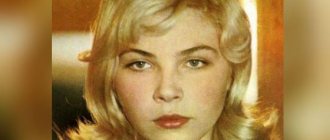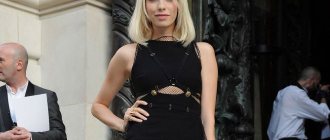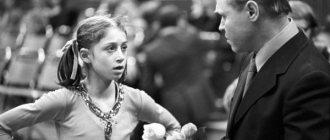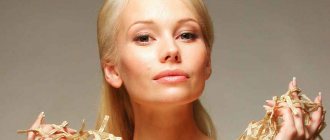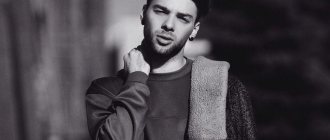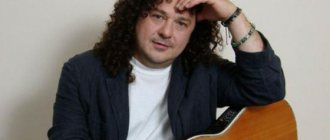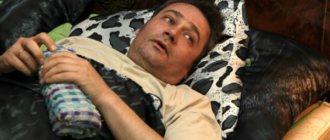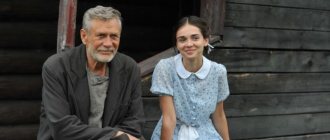Childhood and youth
Elena Abdulaevna Hanga was born on May 1, 1962 in Moscow. The TV presenter cannot answer the question of what her nationality is. The roots of the parents' family tree diverge in different and completely unexpected directions.
Abdul Kassim Hanga's father was from Zanzibar, and his grandfather was an imam. Hanga's adoptive father was African-American Lee Young, who today lives in Los Angeles. The mother of the famous TV presenter Liya Oliverovna Golden was born in Tashkent. Her father, Oliver Golden, was African-American, and her mother, Bertha Bialik, was a Polish Jew.
Elena Hanga as a child (still from the program “The Fate of a Man”)
Elena Hanga was raised by her mother and grandmother. Like Leah Golden, she played tennis and even played for the CSKA team. The grandmother spoke to the girl in English so that she would master the language perfectly as quickly as possible. Elena went to a special school with advanced English, and after graduating from school she entered the journalism department of Moscow State University.
After graduating from Moscow State University, the journalist completed an internship at New York and Harvard universities. Soon the girl decided that she wanted to get another higher education, and entered the psychotherapist at New York University.
Elena Abdulaevna Hanga is a Russian journalist and TV presenter. She is best known as the author and host of the popular TV shows “About This” and “The Domino Principle.” Biography Elena Hanga was born in Moscow on May 1, 1962. Father - Abdul Kassim Hanga, the son of an imam, was the prime minister of Zanzibar, repressed after the coup d'etat and died in prison. Mother - Liya Oliverovna Golden was born in 1934 in Tashkent in the family of African-American Oliver Golden and Berta Bialik; they emigrated to the USSR from the USA in 1931. Mother Leah Golden played tennis in her youth, played for the Uzbekistan national team, and graduated from music school. She entered the university, graduated from the Faculty of History of Moscow State University, defended her thesis, historian, professor at the University of Chicago. Elena Hanga also played tennis, played for CSKA, her coach was Anna Vladimirovna Dmitrieva. Elena graduated from the Faculty of Journalism of Moscow State University, after which she studied at Harvard and New York Universities. After Moscow State University, she worked at the Moscow News newspaper; she was invited to Boston as an exchange student, where she worked at the Christian Science Monitor newspaper. *** “Uzbekcha gapirasizmi?” I hear familiar words and understand that the question is addressed specifically to me. I just said that I came to New York from Tashkent. But for some reason I was confused when I heard Uzbek speech in America, and answered completely out of place: “Yes.” And only then did I understand what had taken me by surprise. However, Lily GOLDEN will surprise me with her life story more than once.
The New York Women's Club is an elite place. Here it is customary to talk about lofty matters, draw, and play music. Refined ladies warmly greet all guests. A tall dark-skinned woman who appeared a little later than the others immediately became the center of attention. Lily Golden spoke Russian with her friends as naturally as in her native English. Such competent Russian speech in the mouth of an African-American woman is a noticeable fact in itself. Not expecting that my new friend also spoke Uzbek without any accent, I was really confused for a minute. And then the questions started pouring in.
Lily Golden decided to answer everything at once, taking her book out of her purse. I read its title - “My Long Way Home” and understand that this woman did not always live in America. I turn through one page after another and stop at the chapter “Uzbekistan is my homeland.” The sudden applause of a virtuoso performer of Beethoven's music reminded me of decency. But it’s very difficult to stop reading the amazing story described in the book I was holding in my hands. Lily comes to the rescue: “Unfortunately, I can’t give it to you. I only brought one copy to New York for my friend, but I’ll give it to her to read. Then we can meet, I’ll tell you everything. I think you can help me."
“It’s amazing how I can be useful to such an eminent person whom I met completely by chance?” I thought to myself, but this time I refrained from asking questions. Having written down the address where my new friend is staying, I leave the women's club, as they say, in English. I would like to quickly start reading Lily Golden's book.
It’s still hard to believe that this is the real life of a person I know, and not a script written by Hollywood writers. But Lily Golden is sitting in front of me in Manhattan, in her friend’s apartment, where she was staying after arriving from Chicago. Now nothing interferes with the memories.
“My grandfather was a slave on the Mississippi cotton plantations. And then, after the abolition of slavery, he became the richest planter in this state. My dad Oliver Golden worked with his dad. He received an excellent education in the field of cotton breeding. My mother's fate was difficult. Polish Jewish woman Berta Bialik shocked everyone by throwing in her lot with a dark-skinned guy. And when he decided to go to Uzbekistan, the family disowned his mother forever. They never understood the action of their daughter, who followed her black husband to a country unknown to them. It wasn't just my mother's parents who were racist back then. Do you know how dad sought this trip? America sent its specialists to different countries, but they were only white people.
Oliver Golden assembled a team of the most talented African American scientists. In 1931, 16 people came to Uzbekistan, to the Fergana Valley.
— Many books and articles have been written about why my father chose Uzbekistan. I even had a chance to see a play about this staged by one of the California Drama Theaters. He wanted, together with Uzbek specialists, to develop cotton varieties suitable specifically for this region. This was a scientist's dream.
In the gloomy year of 1937, Golden's team disbanded. Not by choice, of course. During the period of repression, many foreigners were forced to leave. At that time, Oliver Golden and Berta Bialik were already living in the capital of Uzbekistan, their daughter was born.
— Dad taught at the Tashkent Irrigation Institute, and mother became an English teacher at the Institute of Foreign Languages. My father died in 1939 and was buried at the Botkin cemetery. Do you know where it is?, Lily Golden asks me.
“My father is buried there,” I answer.
And then our conversation is more like a meeting of two compatriots.
— In 1942, I went to the first grade of the 32nd Tashkent school. And I also went to a music school at the conservatory. What is the name of the street now where the Tashkent Conservatory is located? - asks Lily.
I tell you that a new one has already been built, near the Pakhtakor stadium.
- I know very well where it is. I am very proud of one fact from my biography. In 1948, I became the champion of Uzbekistan in tennis in singles and doubles,” my interlocutor recalled.
I tell Lily that many tennis courts have been built in recent years, I talk about everything that I knew and saw with my own eyes while working as a journalist in Uzbekistan. We seem to have quietly switched roles. Lily listened very carefully, sometimes surprised that I was not talking about the country she was from. And I soon understood why a professor at the University of Chicago, a member of many international charities, considered our chance meeting at the New York Women's Club a success. Lily Golden works in one of the Washington organizations that helps women from different countries develop small businesses.
“When my colleagues found out that I was born and lived for quite a long time in Uzbekistan, they were delighted. Americans want contacts with Uzbekistan, but sometimes they don’t know how to find people interested in this. We could assist Uzbek business women in developing any business. But we need real projects. Our organization has extensive experience in such activities. We help financially and increase knowledge in the field of doing business and, if necessary, assist in finding markets for goods. But I would like to know who specifically in Uzbekistan is interested in cooperation with us, and to receive their business proposals. We would respond immediately, come and resolve all issues on the spot. As you can see, I haven’t forgotten Uzbek yet, so there won’t be any obstacles. You know, back in school I spoke Uzbek better than anyone else.
And again the memories take us back to the past.
“During the war, we, junior schoolchildren, were taken out to pick cotton. We worked in the fields, and the teachers did not know what to feed us with. Very often I was sent with an empty cart drawn by a donkey to travel around villages precisely because I spoke Uzbek fluently. Amazingly kind people live on this earth. They themselves had a hard time, but no one ever let me go empty-handed. I brought back an arava full of flatbreads. And I myself was already well-fed, I was fed in almost every house, they even gave me tea with sugar. This was very rare in wartime. By the way, pilaf is still my favorite dish.
— How did it happen that you left Uzbekistan? Perhaps there is some amazing story connected with this? - I guess.
— In 1952, I entered the history department of Moscow State University. It was very prestigious. I left just to study, but one day there was a knock on the door of my room. When I opened it, I heard the categorical words: “I came to marry you by decision of the revolutionary council.” This is how I became the wife of the Prime Minister of Tanzania, Abdullah Kasim Hang. Maybe you know our daughter, Elena Khanga?
“Who doesn’t know the magnificent host of The Domino Principle,” I interrupt impatiently. Lily Golden's face lights up with the light of love and pride.
— So they also know Lenochka in Uzbekistan? And I teach my granddaughter Elizabeth Uzbek dances. She knows how to do this beautiful movement.
Lily's head moves smoothly and artistically from left to right, as in a traditional Uzbek women's dance. Lily Golden's last name can be found in the credits of 10 famous films in which she starred. And the famous comedy “Nasreddin in Bukhara” is her acting debut.
— I’ve been to many countries, but I always say that my happiest period was life in Uzbekistan. So many famous people visited our house in Tashkent! I was friends with the daughters of Mukhtar Ashrafi, Tamara Khanum came to visit us, Paul Robeson came from America. Father was respected and invited to all significant events. I am very glad that the United States is now showing interest in Uzbekistan. I would like to keep in touch with my homeland.
“You are an amazing Uzbek American or American Uzbek, I don’t even know what’s better to say,” I joked finally.
“I don’t know anymore,” Lily admitted. What is the name of the newspaper where your article will be published? "News of Uzbekistan"? I like. Right now I am very interested in news from Uzbekistan. And now I will also wait for invitations from business women of Uzbekistan.
And, if the collaboration takes place, maybe one day another new book will appear - about another Uzbek period by African-American Lily Golden. Perhaps the title “My Homecoming” would suit it.
Zhanna ZAKHAROVA
Journalism and television
After an internship in America, Elena Hanga began working with Dmitry Zakharov, Vlad Listyev and Alexander Lyubimov at the VID television company. In 1993, she was invited to work as a sports correspondent for the NTV channel and report on the Olympics taking place in Atlanta.
Elena Hanga in her youth / Facebook
In 1997, the TV presenter appeared in Leonid Parfenov’s new program “About This.” At first, Elena Hanga refused, since it was a program on very frank and risky topics, but Parfenov convinced her that the program was doomed to success.
With the program “About This,” Lena’s television career began to take off: she entered the Book of Records, and The New York Times wrote about her. But after 3 years, the “About This” program was closed, as it had completely exhausted itself.
Interview in the program “The Fate of Man”
Not long ago, Elena Hanga became the new heroine of Boris Korchevnikov’s program. In an interview, the famous TV presenter admitted about the special inheritance that her dad left her.
Abdula Kassim was the Prime Minister of Zanzibar. According to Elena, she doesn’t remember her father well, since he lived in his homeland, and she and her mother lived in Moscow. Hanga's mother Leah Golden refused to accept help from Abdul throughout her entire life. I always did everything myself.
As Elena now recalls, when she went to Tanzania, she did not even suspect that her father had left something for her there. According to the TV presenter, her grandmother met her in Zanzibar. Then the woman gave Elena a valuable item.
According to Hanga’s recollections, her grandmother led her to a large chest, opened it, and there were several books inside. Abdul Kasim told his relatives that only Elena should receive them as an inheritance. As you know, a famous TV presenter brought these books to Boris Korchevnikov for a show, who was amazed.
There's beauty behind the mask: the story of a nurse who works on the front lines
Ksenia Katalymova said that “Peace, Friendship, Chewing Gum” is a special series for her
Only the young will understand. Nikita Presnyakov explained why not everyone loves his music
Movies
The woman also tried herself as an actress. She took her first steps in cinema as a child - her first role as Elena Hanga happened in 1970 in the film “Black Sun”.
In 1981, Lena had a role in the crowd of the film “The Invisible Man.” Later she appeared in the films “New Tales of Scheherazade” and “The Last Night of Scheherazade.” Hanga also starred in the detective series “Eulampia Romanova – 3: Forecast of nasty things for tomorrow”, where she played the role of virologist Ngwanya Mbow.
Elena Hanga and Romualdas Ramanauskas (still from the film “The Invisible Man”)
The latest work in the TV presenter’s filmography was the film “Park of the Soviet Period” directed by Yuli Gusman. The film stars Russian cinema stars - Alexander Lazarev Jr., Elizaveta Boyarskaya, Mikhail Efremov, Nina Usatova, Lidiya Fedoseeva-Shukshina and others. Elena Abdulaevna was invited as a cameo.
"The Domino Principle"
In 2001, Elena was again invited to become the host of the program. There were supposed to be two co-hosts. Initially, Hanga appeared in front of television viewers together with Ishcheeva, the second co-host was Starostina, and then Dana Borisova. The theme of the program was about life, as well as about what surrounds us.
A friend taught me how to quickly peel an orange. Now I can do it in a few seconds
Monkeys learn to keep their distance from childhood: scientists studied groups in Ghana
Mariana Arias is already 54 years old, the actress has long disappeared from the screens and gone into business
Personal life
According to Elena Hangi, she has always been amorous; the TV presenter experienced her first romantic feeling at the age of 9, when she met a guy from the Estonian team at a tennis competition in Tartu. As a student, she had a boyfriend named Vasily, who treated the girl with care and tenderness, and his friends nicknamed Elena Boniemochka.
Elena Hanga and her daughter Elizaveta-Anna / Facebook
Hanga connected her life with another person. Elena's husband's name is Igor Mintusov. The TV presenter's chosen one is a political scientist. The future spouses met during their student years at Moscow State University. In 1988, Igor proposed to Lena, but the girl refused, as she had plans to travel the whole world and make a career. The lovers separated for a while, but soon met again, and Igor proposed for the second time. Elena Hanga agreed.
In January 2001, the wedding of the TV presenter and political scientist took place. The event took place in America, in Los Angeles, where most of Hanga’s relatives live. The lovers prepared for the wedding for a long time and carefully, only the wedding dress took a year to sew. Elena says that her husband loves to travel, but wants to live in Russia. The TV presenter is proud of Igor and considers her husband a very smart man.
Elena spoke about her father's harem
The popular TV presenter spoke about her dad Abdul Kassim. Elena admitted that her father had a harem, which greatly upset her mother, who did not understand such customs. As Hanga now says, the parents met in Moscow, then formalized their relationship.
The father was waiting for his son, but a girl was born, the disappointment was very strong. Later, Hanga's parents began discussing moving to Tanzania, but Elena's mother was in no hurry to move. As a result, the family lived in two countries. One day the woman found out that Elena’s father had a harem, their relationship became even colder. Then the man was repressed, then arrested, and subsequently died.
Life doesn’t work out: why Harry and Meghan “endure” life in Los Angeles
Men believe that masks are a sign of weakness: they take risks and take them off
Where did Russian nobles get a lot of money for a rich life and what did they spend it on?
Biography and personal life of Elena Hanga
The girl was born on the day when the Soviet Union celebrated the holiday of spring and labor in 1962. As the journalist herself says, her mother went to a workers’ demonstration, and then it was time for her to visit one of the capital’s maternity hospitals.
Father Abdul Kassim Hanga was happy about the birth of his daughter. But in 1964 he had to leave for his homeland, Zanzibar, where he became prime minister. The man left his family in the Soviet Union for some time, as his wife was finishing her studies at one of the universities. After a year and a half, they were supposed to follow their father and husband to Zanzibar.
At the age of 2 months, the girl was left without a father, since Abdul Kassim was subjected to repression, and as a result of imprisonment under mysterious circumstances, his death occurred. Nobody knows where his grave is.
Mother, Liya Oliverovna Golden, was left alone at the age of 21. After graduating from the Faculty of History of Moscow State University, she began working at the Patrice Lumumba University. Mom soon married an African-American man, Lee Young, who became Elena’s adoptive father.
The girl attended a sports section where she played tennis. Since childhood, grandmother helped Elena learn English by talking to her at home. Hanga then studied at a special school where English was studied in depth. During her school years, she attended a drama studio, danced, and tried to sing. But in high school, she decided to connect her destiny with journalism, entering Lomonosov Moscow State University. It was during her student years that she played in several films. Elena Hanga especially attracted the attention of film fans, appearing as one of the dancers in “The New Tales of Scheherazade” and “The Last Night of Scheherazade.”
After receiving a diploma from Moscow State University, the girl received a second higher education. She became a psychotherapist.
At first she began working for the Moscow News newspaper. In mid-1987, she interned in the United States of America at one of the largest publishing houses.
At this time, the biography and personal life of Elena Khanga began to flow in parallel. Her chosen one is Igor Mintusov, who later becomes her husband and father of her daughter.
For some time, an ambitious and talented girl worked at the Rockefeller Foundation. In the early 90s, Hanga published a book that revealed its own family tree. At this time, Elena Hanga begins working in “Vzglyad” together with Vladislav Listyev and Alexander Lyubimov. Since 1992, the young TV presenter has been commenting on sports competitions. Since 1997, he began hosting the TV show “About This”, at which time its popularity began. Despite its popularity at the beginning of the new millennium, the TV program “About This” was closed.
From 1998 to 2002, she hosted the television game “Russians at Fort Bayard” together with Leonid Parfenov, which she had to leave due to work on another television project, “The Domino Principle.” Her colleague was Elena Ishcheeva, who was later replaced by Dana Borisova.
In 2009, the program ceased to exist. But Elena Hanga was not without work for long. Soon she began hosting several programs on radio and television. The famous presenter participates in a large number of different television programs as a guest expert.
At the end of 2020, the World Festival of Youth and Students was held in the Russian Federation, in which Elena Hanga took part.
Children of Elena Khanga
In October 2001, she gave birth to a daughter, whom her happy parents named Elizaveta-Anna. Later it became known that the girl was sick. The diagnosis was not specified, but Hanga, at the peak of her popularity, left her career and began raising her only child.
The girl is 18 years old, she plays tennis (not at a professional level), and actively maintains a page on Instagram. Plans have not yet been announced. From the photo it is obvious that she is very similar to the star’s mother.
Journalism
The creative biography of Elena Khanga is no less interesting and amazing than her family and pedigree. In the 1980s, Elena played for the World Team in KVN. And in 1989, after an internship in America, Vladislav Listyev invited Elena Hanga to a cameo role in the TV show “Vzglyad”. Since the program was popular at that time, the girl did not go unnoticed. Soon she began working with D. Zakharov, V. Listyev and A. Lyubimov, or, as she called them, with the “trinity of musketeers.” Hanga called these years of work the most fun.
Journalist Elena Hanga
In 1993, she was invited to work as a sports correspondent for the NTV channel and report on the Olympics taking place in Atlanta. The next offer was in 1997 in the new program “About This” by Leonid Parfenov, which became one of the highest rated on Russian television. At first, Elena Hanga refused, since it was a program on very frank and risky topics, but Parfenov convinced her that the program was doomed to success.
With the program “About This,” Lena’s television career began to take off: she entered the book of records, and The New York Times newspaper wrote about her. But three years later, the “About This” program was closed because it had completely exhausted itself.
In 1998, Elena Hanga tried her hand at a new project. The girl became Leonid Parfenov's co-host in the test pilot episode of the television game “Russians in Fort Bayard,” an adaptation of the popular French television game Fort Boyard, filmed with Russian participants. The pilot episode consisted of three games, which received warm reviews from viewers and critics, so the project was launched and existed until 2006 and survived an attempted revival in 2013. But Elena Hanga hosted the show only until 2002, after Parfenov and Hanga were replaced by Sergei Brilev and Yana Batyrshina.
Dana Borisova and Elena Hanga in the program “The Domino Principle”
Soon Elena Hanga received a new proposal. In 2001, she was invited to become the host of the “Domino Principle” program, which she hosted first with Elena Ishcheeva, and then with Dana Borisova. The program, which talked about what surrounds us in this life, was quite successful.
From 2009 to this day, Elena Hanga has been hosting the talk show “Cross Talk” on the English-language channel Russia Today. She also collaborates with the Komsomolskaya Pravda radio, and since 2011 she has hosted the TV show “With a remote control through life” on the KP-TV channel and the “In Search of Truth” program on the Komsomolskaya Pravda radio.
